Pongal is a delicious South Indian porridge like dish that is made with rice and yellow moong lentils. It can be made sweet or savory. Here I share the savory version of Pongal recipe known as Ven Pongal or Khara Pongal laced with the wonderful flavors of cumin, asafoetida, curry leaves, ginger and black pepper. Not to forget the lovely aroma of ghee, in it.
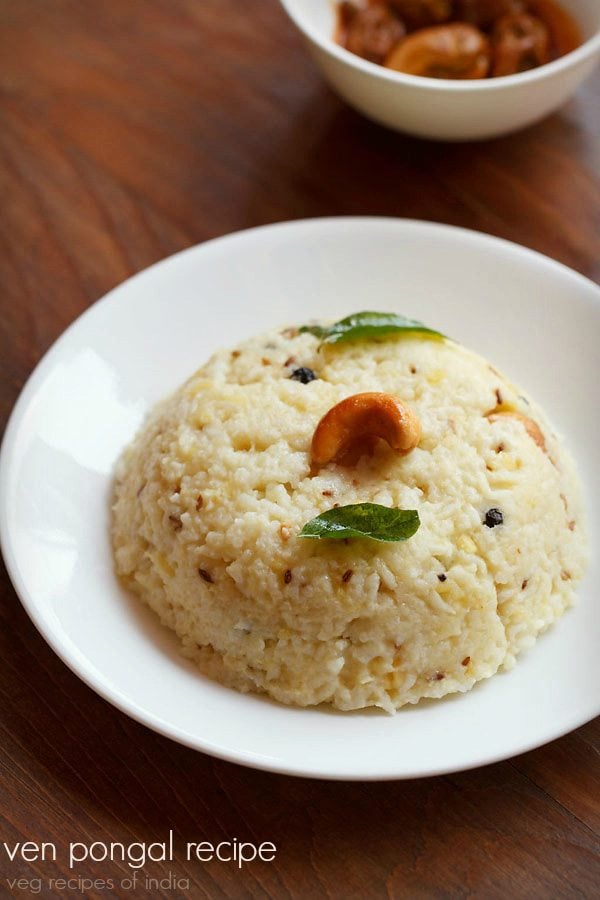
About Pongal Recipe
Pongal is a popular recipe having both savory and sweet versions. It is made during the popular Pongal Festival or other Hindu festivals in South India and is offered to the deities as naivedyam (offerings of food).
The savory and spiced version is called Ven Pongal. Here the Tamil word “ven” means “white” and “pongal” means “boiling or bubbling over and overflowing”.
Pongal has always been our favorite dish. After having one of the best Ven Pongal at the Tirupati Balaji temple, I have been looking out to make it exactly the same way it was made there.
Recently we got the chance to savor ven pongal in JW Mariott hotel on their breakfast menu. It was a good. Though not exactly like the ven pongal we had in Tirupati temple, but definitely a tastier one.
Table of Contents
The extra amount of ghee they added in their khara pongal made a lot of difference to the taste. They would also add grated fresh coconut to their pongal.
So when I have been looking out for a comforting yet a really good ven pongal recipe, I asked one of my very dear reader and friend, Durga aunty about her method.
Durga aunty was quick enough to give me her mother’s recipe to make ven pongal. She gave all the finer details to cook the best pongal.
Durga aunty is in her 70’s and this recipe is from her mother. Thus making this recipe almost a 100 year old family recipe.
When I made this recipe it was so good and reminded me of the ven pongal recipe we had at the Tirupati Balaji temple – yes it came pretty close to that pongal recipe.
Thank you Durga ji. This post is dedicated to you.
Ven Pongal Ingredients
- Rice: Here as suggested by Durga ji, I have used seeraga samba rice as it gives a good flavor. But if you do not get seeraga samba rice, you can use any regular medium to short grained white rice.
I make khara pongal with any short grained Indian variety of rice available in the kitchen – surti kolam, sona masuri, ponni or indrayani. You can easily buy these Indian varieties of rice on amazon or online.
During the pongal festival, this traditional dish is always made with freshly harvested rice and fresh lentils. Try not to use old or aged rice and lentils. - Moong lentils: Ven pongal is made with husked, split and yellow moong lentils. Try to use fresh lentils and not aged ones as they will take a lot of time to cook.
- Spices and herbs: The spices, herbs that bring so much taste and flavor in ven pongal are cumin, black peppercorns, curry leaves, ginger and asafoetida. Try to include all of them and do not skip on any one.
- Ghee: Also known as clarified butter, ghee is yet another important ingredient which imparts so much aroma to this dish. You can always add more but do not add less of it.
- Cashews: Nutty cashews add a fabulous crunch, but you can skip these nuts if you are allergic to them.
- Black Pepper: Whole black peppercorns is one of the key ingredient that is added in ven pongal. The black peppercorns are added whole and when you eat khara pongal, you also bite into the black pepper.
If you do not favor or like biting into a whole black pepper, then crush the black pepper coarsely and add.
Usually I add crushed black pepper, but since I wanted to share an authentic method, I did not crush black peppers for this recipe post.
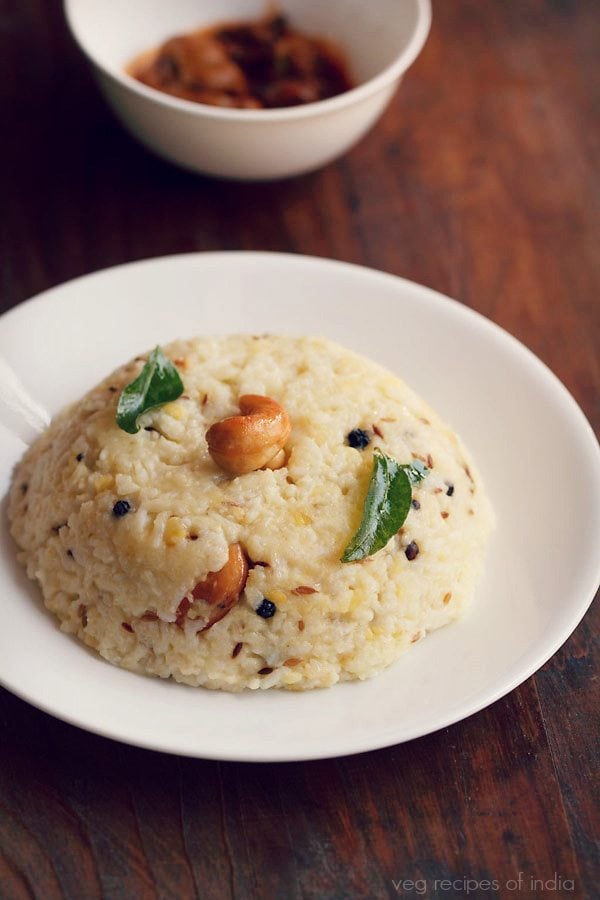
Two sweet and savory variations of Pongal Recipes are:
- Sweet Pongal – A creamy, sweetened version made with nuts, ghee and jaggery.
- Rava Pongal – A delish savory version made with semolina, ghee and nuts.
How to make Ven Pongal
Before you begin there is some quick prep work like roasting moong lentils and rinsing rice, lentils. Further on making khara pongal is a breeze. Wherever possible, I have mentioned tips and suggestions so that you make a perfect ven pongal.
Roast Moong Lentils
1. Pick ¼ cup of moong dal first to get rid of stones if any. Then heat a small pan or a small kadai and add the moong lentils.
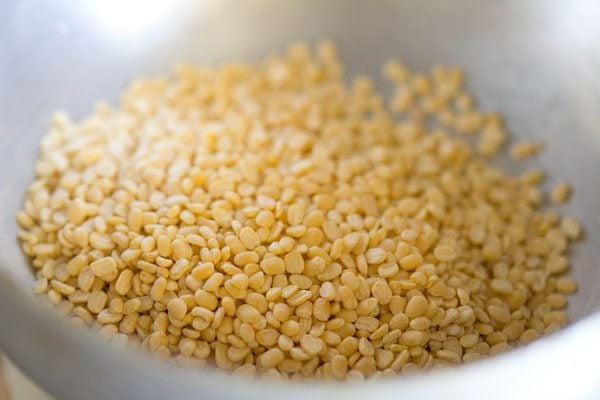
2. On a low heat stirring often roast the moong lentils until they become fragrant.
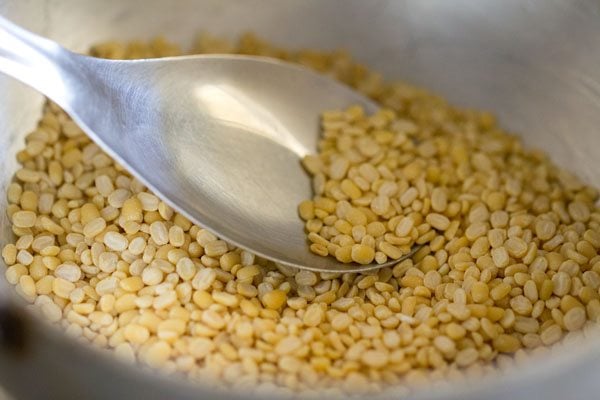
3. You need to roast the moong lentils until they become fragrant. There is no need to brown them.
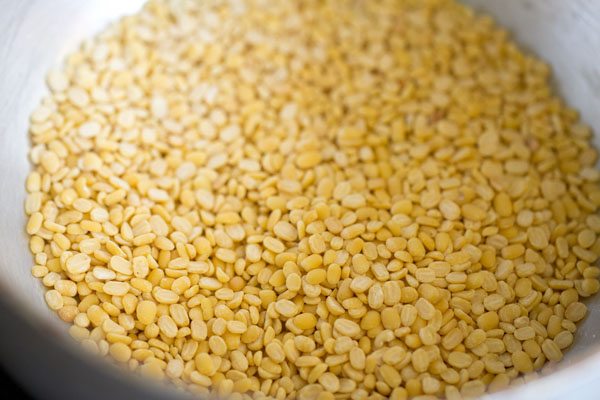
4. Take the roasted moong lentils in another bowl or you can use the same pan for rinsing.
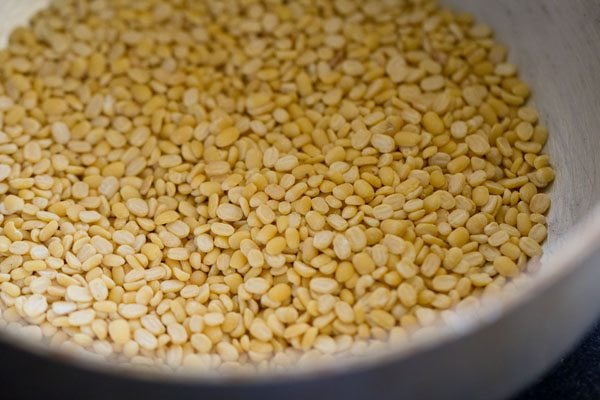
5. Add ½ cup rice in the bowl containing the roasted moong dal. You can use any non-sticky short to medium grained white rice.
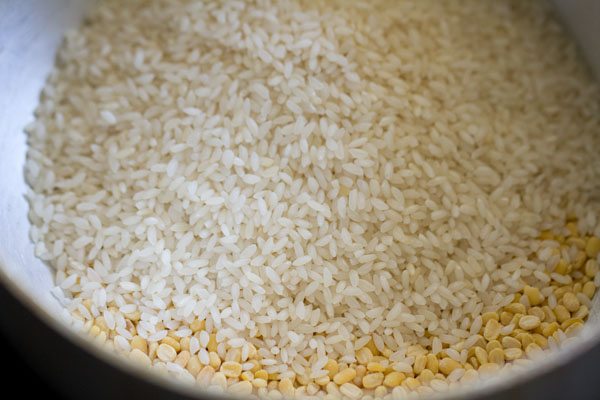
6. Rinse both rice and the roasted moong dal a couple of times with water.
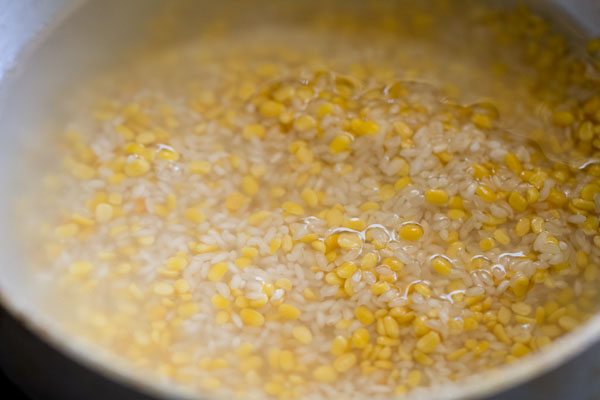
Make Ven Pongal
7. Drain very well and then add them in a 3 litre stovetop pressure cooker.
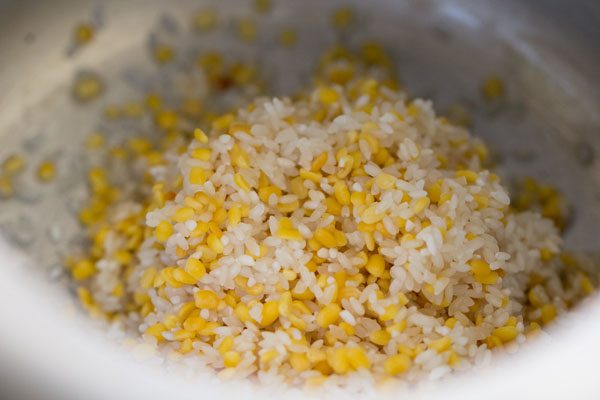
8. Now add the following ingredients – ½ teaspoon cumin seeds, ⅛ teaspoon asafetida (hing), 1 teaspoon heaped chopped ginger. Add salt according to your liking.
Tip: Crushing the cumin seeds lightly in your palms before adding gives a nice aroma.
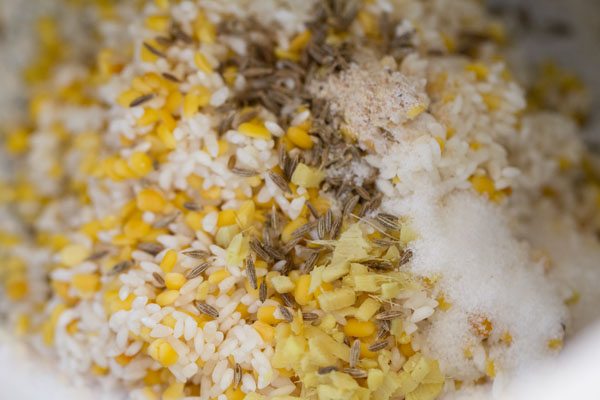
9. Pour 3 to 3.25 cups water. The amount of water to be added depends on the consistency you want and on the quality of moong dal.
Usually I cook the moong lentils for 7 to 8 whistles. Thus I add 3.25 cups water. If you get moong dal, that cooks faster with 2 to 3 whistles, then add about 2.5 cups water.
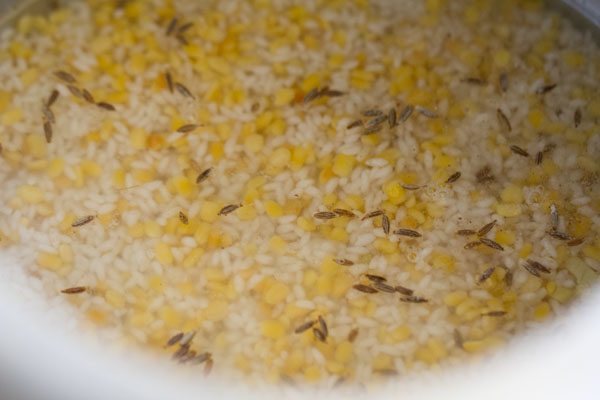
10. Pressure cook on a medium to high heat for 7 to 8 whistles or 11 to 12 minutes. For moong dal which cooks quickly, you can pressure cook for 2 to 3 whistles.
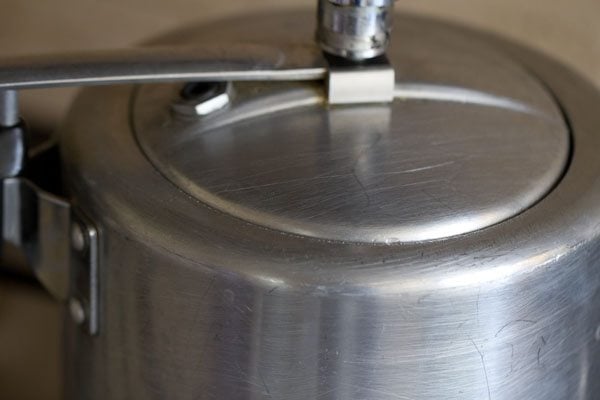
11. Let the pressure settle down on its own in the cooker and then only you remove the lid to check the doneness and consistency.
The consistency of pongal is mushy and like a Khichdi or a porridge. Both the rice and the moong dal should be cooked very well.
If you want you can even slightly mash the cooked rice and moong lentils. If cooked well, then cover with the lid and set aside.
Tip: If the pongal has a consistency like that of a pulao, then add ½ to 1 cup hot water and mix very well.
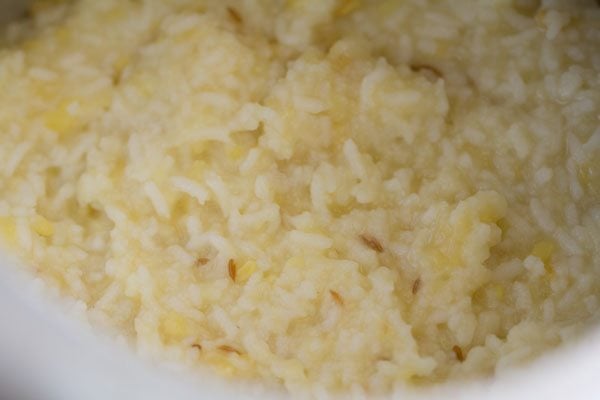
Temper Pongal
12. In another small pan, heat 2 to 3 tablespoons ghee. 3 tablespoons ghee gives a good taste and flavor.
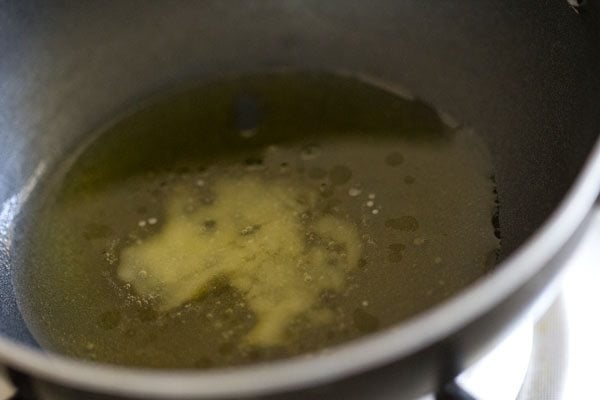
13. Add 1 teaspoon cumin seeds.
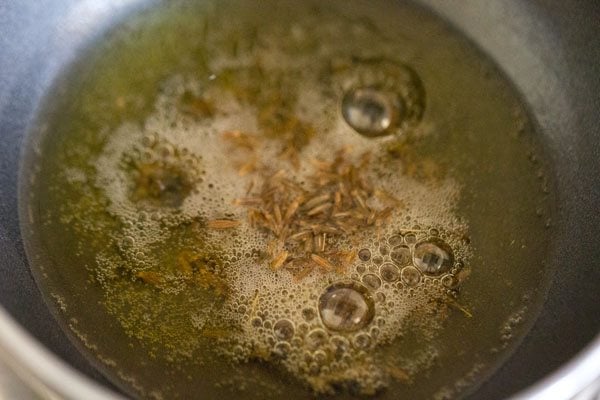
14. Let them splutter.
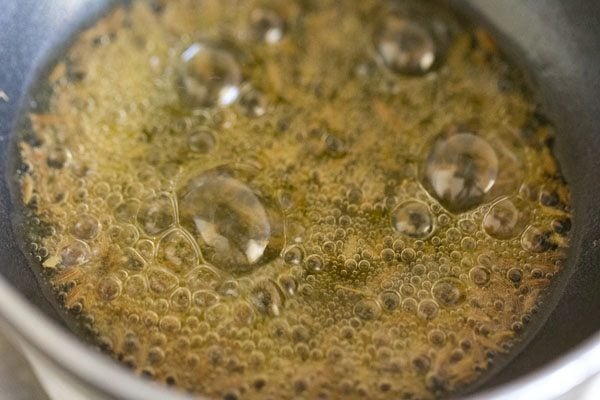
15. Then add 10 to 12 cashews.
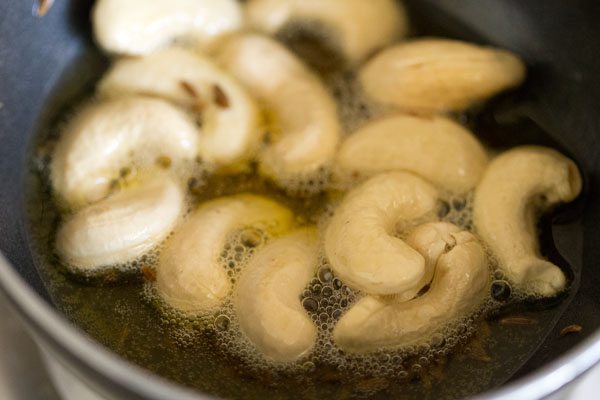
16. Fry until the cashews start to become light golden.
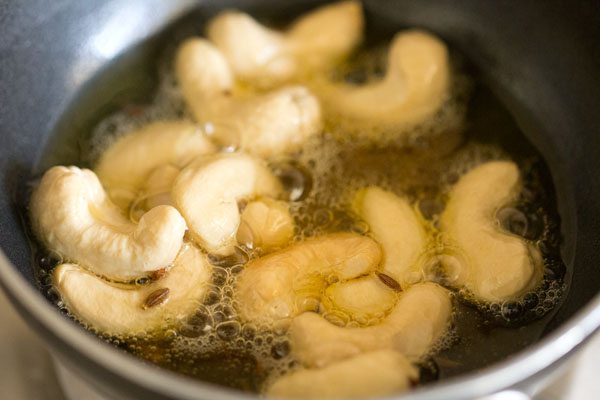
17. Once they begin to get light golden, then add 1 teaspoon black pepper and 10 to 12 curry leaves.
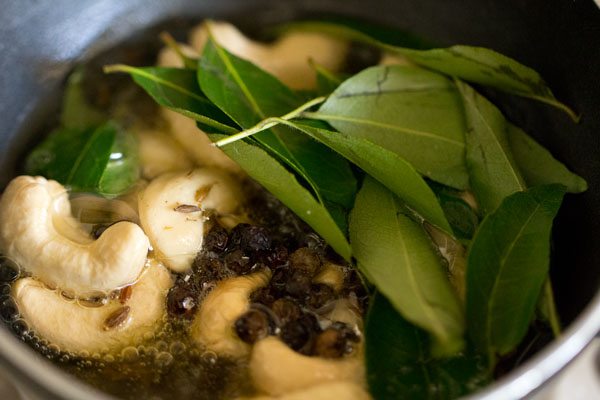
18. Stir very well and fry until the curry leaves become crisp. The black pepper should also be fried well.
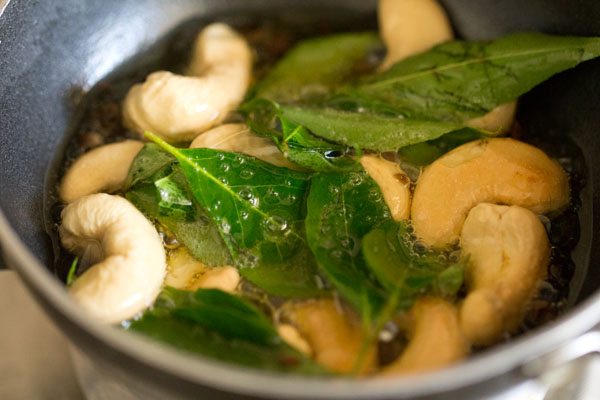
19. Now pour this entire tempering on the cooked rice and lentils.
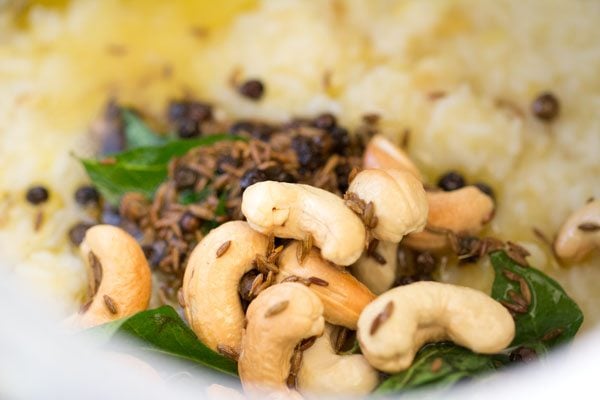
20. Mix thoroughly.
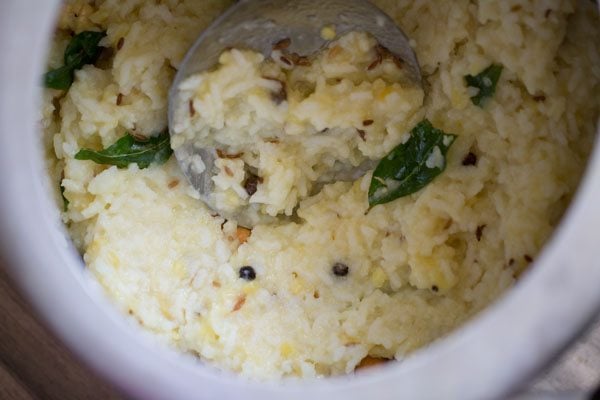
21. Cover with the lid (with the vent weight/whistle on the lid) and set aside for 5 to 6 minutes.
This allows the tempering flavors to infuse with the khara pongal and the aroma to stay in. Then remove the lid and serve ven pongal hot or warm.
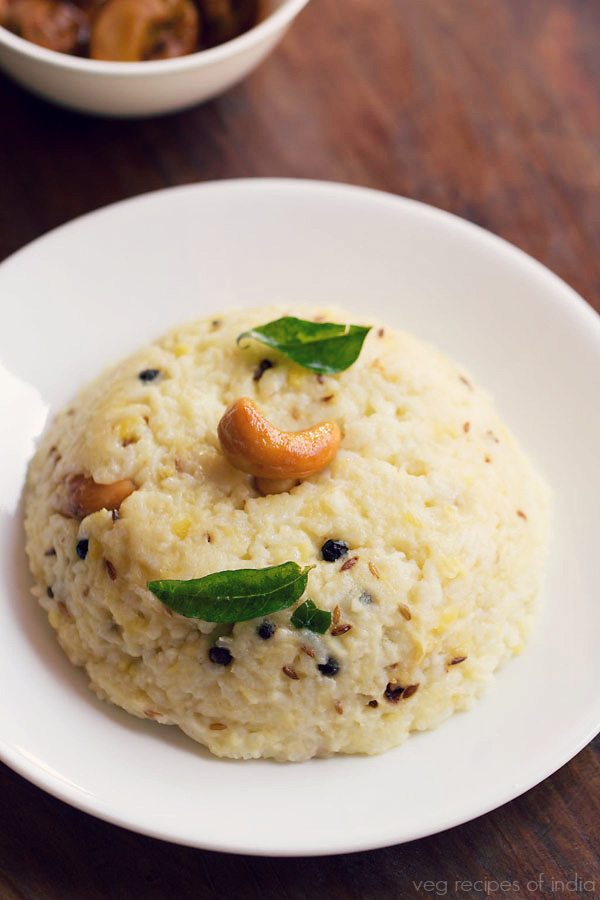
Serving Suggestions
Usually we simply have ven pongal with a side of curd (yogurt) or mango pickle. But it is traditionally served with coconut chutney or sambar.
Durga ji suggests to have khara pongal with either onion gothsu or brinjal gothsu or coconut chutney or idli sambar or kalyana gothsu.
While serving, you can drizzle a bit of ghee on top and garnish with coriander leaves (cilantro) if you prefer.
Khara Pongal Variations
Ven pongal can be made in many ways. You could add grated coconut and even mix vegetables like carrots, french beans, green peas, cauliflower, capsicum or corn.
Add some oats to making oats pongal for a healthy variation. Millets and even cracked wheat (dalia) can be included to make healthy pongal varieties.
Preparing khara pongal does not take much time. You can make it for lunch or dinner, especially if you are short of time or very busy. Then serve it with some pickle or a side of curd or chutney or salad.
How to make Instant Pot Ven Pongal
Most of the times, I prefer making ven pongal in my Instant Pot. But I do roast the lentils separately in the pan and only cook the rice, lentils and spices in the IP. I make the tempering separately to be added later as it adds more flavor.
For cooking ven pongal in the Instant pot, after the roasting and rinsing steps, add the lentil, rice, spices in the steel insert of your IP. Add 3 cups water. Pressure cook on high for 6 to 7 minutes.
Do a quick pressure release after 10 to 12 minutes. If the consistency looks thick, add some water to thin it a bit and using the sauté option, simmer for a couple of minutes.
Later fry the spices, nuts separately in a small frying pan on the stovetop and add to the cooked rice and lentils. Mix and serve.
Expert Tips
Ingredient Notes
- Fresh ingredients: Not only pongal, but when making any recipe always use fresh and good quality ingredients. Do make sure to have your spices fresh and not stale or spoiled.
- Ghee: One of the most important ingredient that gives ven pongal its flavorful aroma is ghee. If preparing ven pongal for any Hindu festival or to be offered to the deities, add fresh ghee made from cow’s milk only. You can always add more of the ghee, but do not add less in the recipe.
- Gluten free recipe: For a gluten free pongal, I would suggest to add a gluten-free asafoetida, rather than skip it completely.
- Black pepper: You can crush the black pepper lightly in a mortar-pestle instead of adding them whole.
Recipe Notes
- Cooking lentils: Depending on the quality of moong dal, it can take less or more time to cook them. I usually cook the moong lentils for 7 to 8 whistles and thus I add about 3.25 cups water.
If you have moong lentils, which cook faster, then add about 2.5 cups water and cook for 2 to 3 whistles. The rice and lentils have to be mushy and the pongal consistency should be like a porridge. - Cooking in a pot or pan: If you do not have a pressure cooker, you can make khara pongal in a pot or pan on the stove-top. Simply follow the recipe and cook the rice, lentils in 3.5 to 4 cups water. Do add more water if needed.
- Lentils and rice proportion: In this recipe, the proportion of rice is more. For more protein, you can easily switch to equal proportions of rice and lentils.
- Scaling: Make a big batch of this recipe easily to feed a crowd.
- Make ahead: I would not suggest to make ahead and freeze ven pongal, as it tastes best when served fresh. On refrigerating or freezing, the pongal will thicken and become lumpy. The taste also changes as well. Lentils and rice are best had freshly cooked.
FAQs
Yes, it is healthy as it comprises both carbohydrates from the rice and proteins from the lentils with some fats from the ghee. The amount of ghee added is also not too much.
Ghee pongal and ven pongal are the same. Basically they are two different names of the same recipe.
Not at all! The consistency of a savory pongal and khichdi is similar, but the spices, herbs that make up both are different. Obviously a khichdi tastes very different than a ven pongal.
More South Indian Breakfasts!
Breakfast Recipes
Breakfast Recipes
Breakfast Recipes
Breakfast Recipes
Please be sure to rate the recipe in the recipe card or leave a comment below if you have made it. For more vegetarian inspirations, Sign Up for my emails or follow me on Instagram, Youtube, Facebook, Pinterest or Twitter.
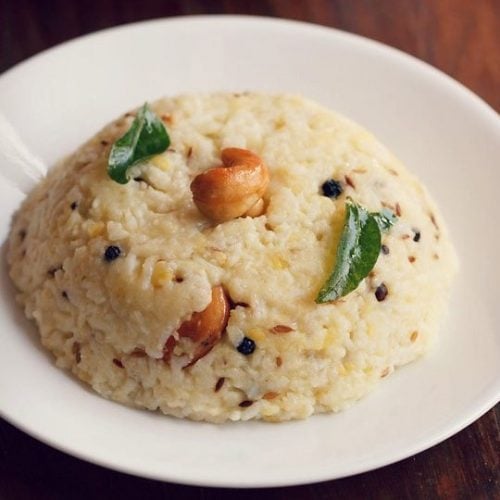
Ven Pongal Recipe | Khara Pongal | Ghee Pongal
Ingredients
Main ingredients
- ½ cup rice – any medium to short grained or regular rice, 100 grams
- ¼ cup moong dal or 60 grams, hulled and split mung lentils
- ½ teaspoon cumin seeds – lightly crushed
- ⅛ teaspoon asafoetida (hing)
- 1 inch ginger – chopped or 1 teaspoon heaped chopped ginger
- 3 to 3.25 cups water or add as required
- salt as required
For tempering
- 1 teaspoon cumin seeds
- 1 teaspoon black peppercorns whole or crushed, you can also add ½ teaspoon black pepper
- 1 sprig curry leaves or 10 to 12 small to medium curry leaves
- 10 to 12 cashews – whole or halved
- 2 to 3 tablespoons Ghee (clarified butter)
Instructions
Roasting moong dal
- Pick moong lentils first to get rid of stones if any. Then heat a small pan or a small kadai and add the moong lentils.
- On a low heat stirring often roast the moong lentils till they become fragrant.
- The moong lentils only need to be roasted till they become fragrant. No need to brown them.
- Now take them in another bowl or you can use the same pan for rinsing.
Rinsing rice and lentils
- Add rice in the bowl containing the roasted moong dal.
- Rinse both rice and roasted moong dal a couple of times with water.
Cooking rice and moong dal
- Drain very well and then add them in a pressure cooker.
- Now add the following ingredients – cumin seeds, asafetida (hing), chopped ginger. Also add salt as per taste.
- Pour 3 to 3.25 cups water. The amount of water to be added depends on the consistency you want and also on the quality of moong dal.
- Pressure cook on a medium to high heat for 7 to 8 whistles or 11 to 12 minutes.
- Let the pressure settle down on its own and then you remove the lid to check the doneness and consistency. If the pongal has a consistency like that of pulao, then add ½ to 1 cup hot water and mix very well.
- Both the rice and the moong dal should be cooked very well. If you want you can even slightly mash the cooked rice and moong lentils. If cooked well, then cover with the lid and keep aside.
Tempering
- In another small pan, heat the ghee.
- Add the cumin seeds. Let them splutter.
- Then add the cashews. Fry until the cashews become light golden.
- Once they begin to get light golden, then add black peppercorns and 10 to 12 curry leaves.
- Stir very well and fry until the curry leaves become crisp. The black pepper should also be fried well.
Making ven pongal
- Now pour this entire tempering on the pongal. Mix very well.
- Cover with the lid (with the vent weight/whistle on the lid) and keep ven pongal aside for 5 to 6 minutes. This allows the tempering flavors to infuse with the pongal and the aroma to stay in.
- Then remove the lid and serve hot with coconut chutney or sambar.
Video
Notes
How to make Instant Pot Pongal
For cooking ven pongal in the Instant pot, after the roasting and rinsing steps, add the lentil, rice, spices in the steel insert of your IP. Add 3 cups water. Pressure cook on high for 6 to 7 minutes. Do a quick pressure release after 10 to 12 minutes. If the consistency looks thick, add some water to thin it a bit and using the sauté option, simmer for a couple of minutes. Later fry the spices, nuts separately and add to the cooked rice and lentils. Mix and serve.Ingredient notes
- Fresh ingredients: Use fresh and good quality ingredients. Do make sure to have your spices fresh and not stale.
- Ghee: Use fresh ghee and you can always add more of it, but do not add less.
- Gluten free recipe: For a gluten free pongal, I would suggest to add a gluten-free asafetida, rather than skip it completely.
- Black pepper: You can crush the black pepper lightly in a mortar-pestle instead of adding them whole.
Recipe notes
- Cooking lentils: Depending on the quality of moong dal, it can take less or more time to cook them. I usually cook the moong lentils for 7 to 8 whistles and so I add about 3.25 cups water. If you have moong lentils, which cook faster, then add about 2.5 cups water and cook for 2 to 3 whistles. The lentils and rice have to be mushy and the pongal should have a porridge like consistency.
- Cooking in a pot or pan: If you do not have a pressure cooker, you can make pongal in a pot or pan on the stove-top. Simply follow the recipe and cook the rice, lentils in 3.5 to 4 cups water. Do add more water if needed.
- Lentils and rice proportion: In this recipe, the proportion of rice is more. For more protein, you can easily switch to equal proportions of rice and lentils.
- Scaling: Make a big batch of this recipe easily to feed a crowd.
- Make ahead: I would not suggest to make ahead and freeze ven pongal, as it tastes best when served fresh. On refrigerating or freezing, the pongal will thicken and become lumpy. The taste also changes as well. Lentils and rice are best had freshly cooked.
- Variations: You can add some mixed veggies like carrots, green peas, french beans, cauliflower or corn. Adding oats will give you a healthy oats pongal. Pongal can also be made with millets or dalia (cracked wheat)
Nutrition Info (Approximate Values)
This Ven Pongal recipe from the archives was first published in April 2016. It has been updated and republished on January 2023.
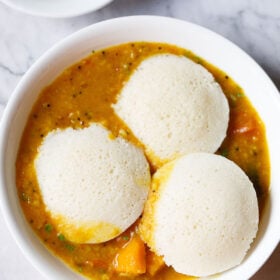
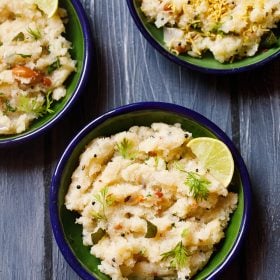
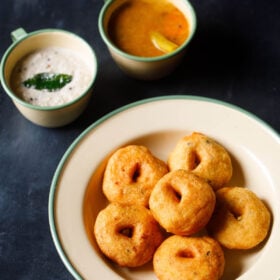
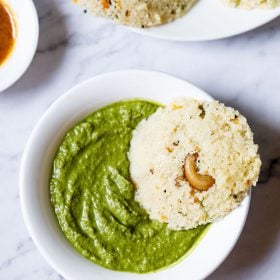
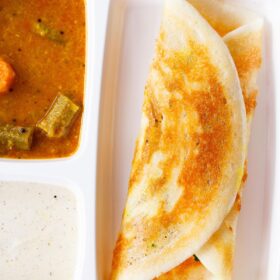
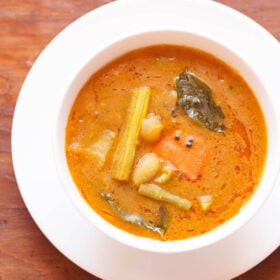








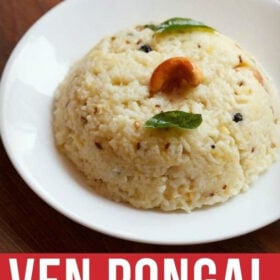
Wow incredible! This can be eaten for breakfast and be a good substitution for oats. Thank you!
Thanks very much for simple yet delicious recipe. I cooked today and my family loved it
Great and thanks for sharing. Thanks also for the rating on the recipe.
Have been following your recipes for years now, they always turn out fabulous. A big fan of your yours.
thank a lot tulip. glad to know. happy cooking and wish you all the best.
Ardent follower for many years now. Thank you for all the lovely recipes ????????????
Hi mam, I m preethi, I always follow your recepies when I am cooking veg. It’s really great mam
thank you preethi. glad to know.
Thank you so much!!
I have this unexplainable utter liking for South Indian cuisine from as long as I can remember. It has always been my comfort food. So subtle yet so flavourful. I had Pongal at the Murugan Idli Shop in Chennai, and that taste just got stuck!! And then I happened to stumble upon this recipe from you, and voila!! It was soooo close to that!! I can safely say, even better!! Thanks a tonne Dassana. You’ve earned yourself a huge fan and an ardent follower today. ????
welcome neha. i am glad that you loved the pongal recipe. so delighted to read your comment. i have been to chennai a couple of times but never had anything from murugan idli shop. maybe next time i should try. thanks again.
Tooooooo good. Came out so well. You can also try adding milk with the water to enhance the flavour.
thanks pavithra for this feedback as well as the rating. thanks also for sharing the suggestion with milk. will give a try.
Loved it. Made it today and I was yummily surprised to taste the black pepper that turned out to be so crunchy in the tempering. Coz honestly I was looking forward to the flavour of it the way it was used in the recipe. And I am totally loving it now.
thank you bhavya. yes the black pepper stands out in ven pongal. pongal looks simple but has awesome taste and flavor.
Hi !
Tried this recipie for breakfast today.Came out yummilicious
Served with Sambar and Onion Chutney.
Can’t find an option to upload pic, elsewhere would have done that.
Thank you !
Welcome Aruna. Nice to know that you liked the ven pongal recipe. We don’t have the option to upload photos. However I am glad to read your positive feedback.
Hello
I’m an ardent fan of your recipes and they are awesome. Can’t you make an app for your recipes? People like me who are learning from you can make more of it.just a thought.
Thanks Pragnyaparamita for your kind words and suggestion. Will think about it.
Can we use basmati rice.as in north India the rice u mentioned is not available.
you can use any regular variety of rice like sona masuri or parmal etc. avoid using basmati rice, but any other regular variety of rice can be used.
I use to make pongal before. I was not very happy with the taste..But recently I followed your steps and it turned out to be very tasty.. thank you so much for sharing a perfect recipe..
Welcome Rashmi. Glad to know that you liked the pongal recipe.
nice taste and easy to make thank you
Welcome Manisha
Which rice ur using mam, raw rice or boiled rice?
Aneesa, i am using raw rice.
I’m just amazed how perfect your every recipe turns out to be… Though I’ve tried many recipes of yours this is the first time I’m leaving a comment. I can blindly trust your recipes and they turn out just so perfect to our taste! Thank your very much ☺️
Welcome Mridula. Thanks for your trust and positive feedback on recipes. Do try some more recipes.
Your recipe on Pongal states that you do not get the Tirupati flavour. Let me tell you that even if made with the choicest ingredients, no flavour of the temple can ever be replicated in any home. There is something beyond mere kitchen ingredients in the temple. Bhakti is enigmatic indeed!
sarada, i do not agree with you in this regard. obviously the temple food always tastes great. but if your home is a temple and your heart is the abode of the divine, then any food that you prepare will have some divine qualities in it. it all depends on your inner being and qualities that you have when you cook. if food is cooked with utmost love, devotion, bhakti and meditation than the food will have a great taste.
Hi..I forgot to add ginger to the dish..its cooking right now..will it be okay or wasted??
no problem. pongal will taste good without ginger too. the key spices are cumin, black pepper and asafoetida.
I’m married to south indian guy your tevopirs have saved from e.nattesment multiple times when my in laws visit they all get pleasantly surprised when I cook for them following your receipie
pleased to know this thankyou so much jawairia 🙂
hi.. love dis pongal.. n iam regular follower of ur blog..love da recipes da way u present here..
glad to know this thankyou for your kind words 🙂
I had pongal many times in A2B during my stay in Bangalore and always liked it. Made it at home today for the first time and happy with the result as it reminded me of good times in Bangalore. Thanks.
welcome and thankyou monica 🙂
it’s my favorite .. thank u for this recipe..
Welcome pooja.
My mom usually add milk once she opened the cooker and keep stove in sim & COntinuously stir. It will taste divine and creamy.
Will do this method next time for sure ☺
Thanks a lot for this recipe. It is really good and came out well.
welcome always shrima and thankyou for your positive comments 🙂
Hi, I am a Tamilian whose a hard core fan of ven pongal n of course yr blog.. For ven pongal we don’t use jeeraga chamba rice. It’s only the regular raw rice we use… also try this proportion, 3/4 cup of rice and 1/4 cup of moong dal…. It tastes much better. Reduce the qty of water by half cup and add milk instead. Tastes awesome…. also, we add ginger, hing, black pepper and cumin seeds to the tadka not while cooking the rice n dal…..
Thanks preethi for the suggestions. Every family has its methods and variations for a recipe and this pongal recipe is no different. Seeraga samba rice is a suggestion from Durga ji’ s mother and they have been making pongal this way. Thats why i have mentioned it in the post. I have made pongal with regular rice too. About the addition of milk, i know. But never tried. I will try using the proportions you have mentioned. I also know about the ingredients for tadka. And i make tadka this way too. But, I wanted to be true to the recipe and hence I have not made any changes to the tadka from the original recipe.